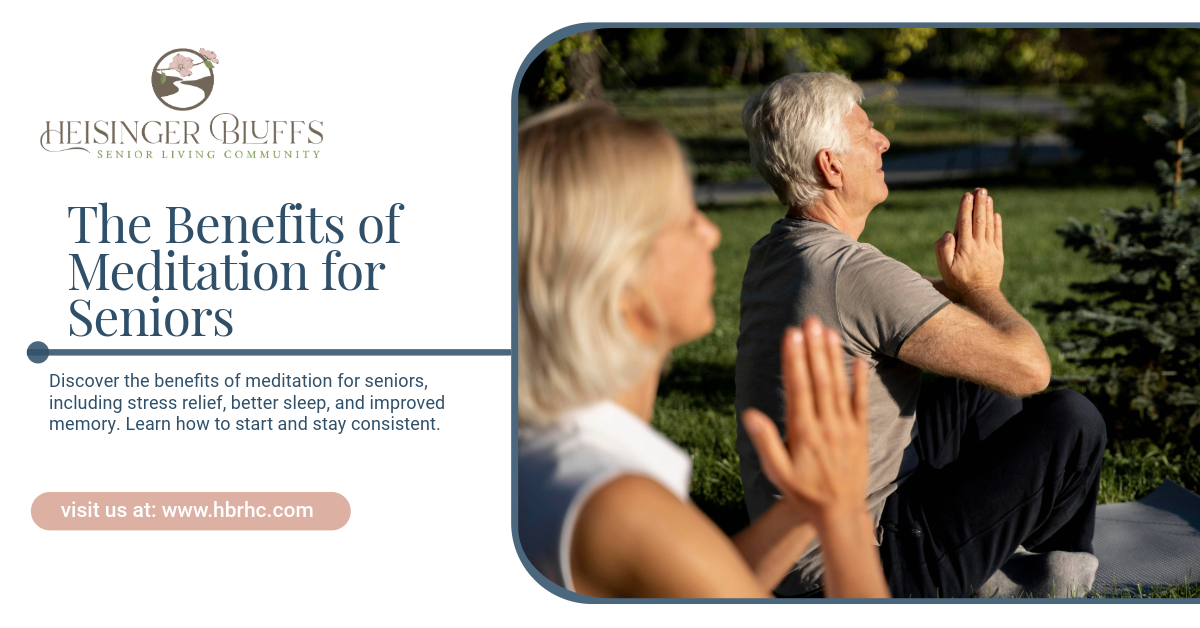The Benefits of Meditation for Seniors

Aging brings wisdom, experience, and new opportunities, but it can also introduce challenges such as stress, memory changes, and health concerns. More and more seniors are turning to meditation as a simple, effective way to nurture their mental, emotional, and physical well-being.
Meditation doesn’t require special equipment, strenuous effort, or prior experience. With just a few minutes a day, seniors can experience profound benefits that improve quality of life and support healthy aging.
In this blog, we’ll explore the key benefits of meditation for seniors, different techniques to try, and practical tips for making meditation part of everyday life.
Why Meditation Matters for Seniors
Meditation is the practice of focusing the mind and calming the body. For seniors, this can be especially valuable because it:
- Reduces daily stress and anxiety
- Improves sleep patterns
- Sharpens memory and attention
- Enhances emotional resilience
- Supports physical health by lowering blood pressure and improving circulation
These benefits combine to create a healthier, more peaceful lifestyle in later years.
Physical Benefits of Meditation for Seniors
Meditation isn’t only about mental health—it also supports the body in important ways.
Key Physical Benefits:
- Lower Blood Pressure: Regular practice helps relax blood vessels, reducing the risk of heart disease.
- Pain Management: Mindfulness-based meditation can reduce chronic pain by changing the brain’s response to discomfort.
- Better Sleep: Calming the nervous system promotes deeper, more restful sleep.
- Boosted Immunity: Lower stress levels support immune system function.
- Improved Balance: Certain meditation practices, like Tai Chi or Qigong, enhance stability and reduce fall risks.
Mental Benefits of Meditation for Seniors
Mental clarity and cognitive health are among the greatest concerns for aging adults. Meditation provides powerful support in these areas.
- Sharper Focus: Mindfulness strengthens attention span and concentration.
- Memory Support: Studies show meditation may slow cognitive decline and support memory retention.
- Emotional Balance: Seniors who meditate often report feeling calmer and less irritable.
- Stress and Anxiety Reduction: Meditation helps regulate stress hormones like cortisol.
Emotional and Social Benefits
Beyond the physical and mental advantages, meditation fosters emotional resilience and stronger relationships.
- Greater Positivity: Mindfulness cultivates gratitude and optimism.
- Emotional Stability: Seniors become better equipped to handle life changes and losses.
- Improved Relationships: Reduced stress leads to more patience and empathy with family and peers.
- Sense of Community: Group meditation sessions encourage connection and shared growth.
Types of Meditation for Seniors
| Type of Meditation | Description | Best For |
|---|---|---|
| Mindfulness Meditation | Focus on breathing and present-moment awareness | Reducing stress and improving focus |
| Guided Meditation | Follows an instructor’s calming voice or audio | Beginners and those needing structure |
| Loving-Kindness Meditation | Cultivates compassion and positive emotions | Emotional healing and stronger relationships |
| Body Scan Meditation | Increases awareness of physical sensations | Pain management and relaxation |
| Tai Chi / Qigong | Gentle movement combined with mindfulness | Balance, mobility, and physical well-being |
How Seniors Can Start Meditating
Getting started with meditation doesn’t need to feel overwhelming.
Steps to Begin:
- Choose a Quiet Spot: A comfortable chair, bed, or outdoor space works well.
- Start Small: Begin with 5–10 minutes a day and gradually increase.
- Focus on Breathing: Inhale and exhale slowly while noticing your breath.
- Use Guidance: Apps, videos, or group classes can help beginners.
- Stay Consistent: Make meditation part of your daily routine, like morning coffee or evening relaxation.
Tips for Making Meditation a Habit
- Set Realistic Goals: Aim for a few minutes daily instead of long sessions.
- Pair with Routine Activities: Meditate after meals or before bed.
- Be Patient: Benefits grow over time, so consistency is more important than perfection.
- Stay Open-Minded: Explore different techniques until you find one that feels comfortable.
Addressing Common Concerns
Some seniors may feel hesitant about meditation. Here are ways to address those concerns:
- “I can’t sit still for long.” → Try moving meditations like Tai Chi or short sessions.
- “I don’t know how to meditate.” → Start with guided meditations or community classes.
- “I’m worried about falling asleep.” → Meditate sitting up in a chair to stay alert.
Long-Term Impact of Meditation on Healthy Aging
Over time, meditation can significantly improve quality of life by:
- Supporting independence through better balance and focus
- Reducing reliance on medication for stress or sleep issues
- Enhancing memory and cognitive function
- Increasing resilience to life’s transitions
For seniors, these long-term benefits make meditation a valuable and sustainable tool for well-being.
Final Thoughts
The benefits of meditation for seniors are far-reaching, from improving physical health and mental sharpness to fostering emotional peace and stronger relationships. With just a few minutes a day, seniors can experience transformative results that enrich their golden years.
Communities like Heisinger Bluffs often encourage holistic wellness practices, including meditation, as part of a well-rounded approach to healthy aging. By embracing meditation, seniors can enjoy a calmer, healthier, and more fulfilling lifestyle. Reach out today!
Frequently Asked Questions
How much time should seniors spend meditating each day?
Even 5–10 minutes a day can provide noticeable benefits. Longer sessions may offer deeper relaxation, but consistency matters more than duration.
Can meditation help with memory loss?
Yes. Research shows meditation may slow cognitive decline and help preserve memory by reducing stress and stimulating brain function.
Is meditation safe for seniors with health issues?
Yes. Most forms of meditation are safe, though seniors with mobility issues may prefer seated or guided practices. Always consult a healthcare provider before starting new wellness routines.
Do seniors need special equipment to meditate?
No equipment is required—just a quiet space and a comfortable seat. Optional aids include guided audio recordings, meditation cushions, or chairs.
Can group meditation sessions help seniors socially?
Absolutely. Group sessions provide companionship, a sense of community, and encouragement to stay consistent.
Sources:
- https://www.ncoa.org/article/the-top-10-most-common-chronic-conditions-in-older-adults/
- https://www.ncoa.org/older-adults/health/lifestyle/wellness-activities/meditation/
- https://www.ncoa.org/article/anxiety-and-older-adults-a-guide-to-getting-the-relief-you-need/
- https://www.nia.nih.gov/health/brain-health/cognitive-health-and-older-adults
- https://www.issaonline.com/blog/post/why-you-need-to-convince-your-senior-clients-to-take-up-meditation











